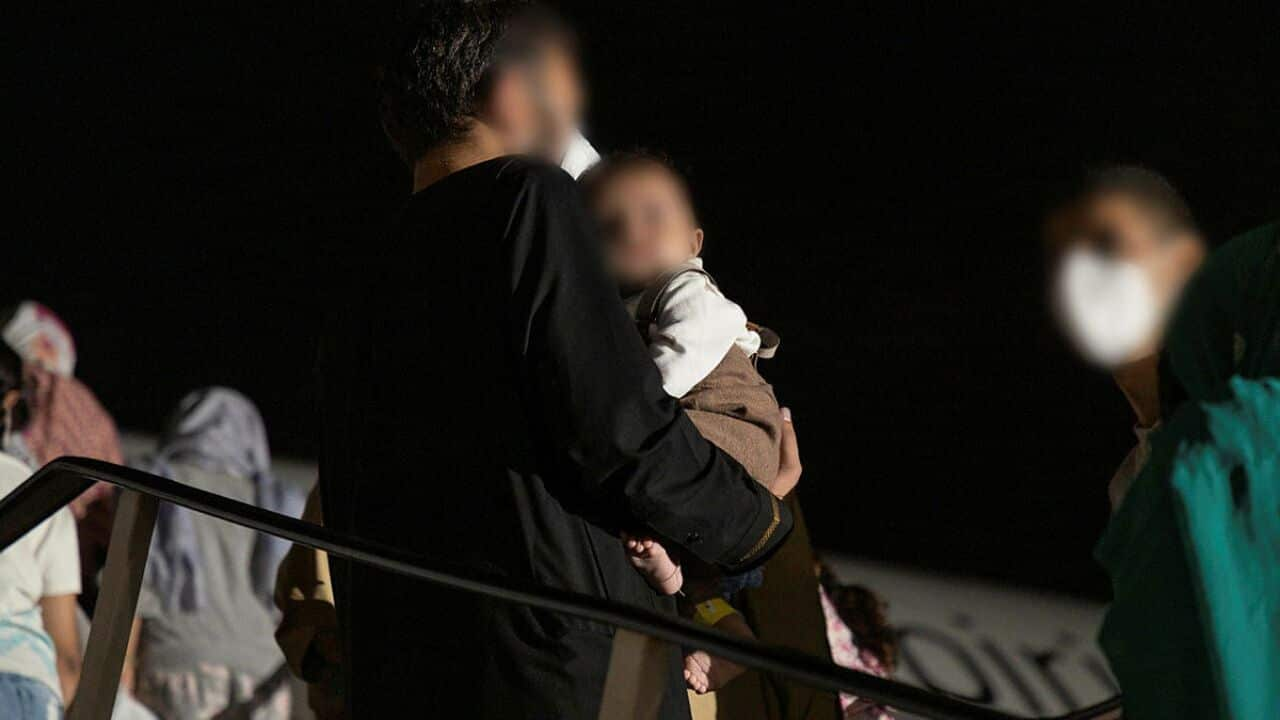The federal government says Afghans who were evacuated out of Afghanistan with temporary visas amid the Taliban takeover will be given a chance at permanent protection.
But there's still uncertainty for hundreds of others who did not make it out of Kabul on military evacuation flights and remain stranded in Afghanistan, with their visas expiring in a matter of weeks.
Hundreds of Afghans, including interpreters and other staff who supported Australia’s mission in Afghanistan during the 20-year war, fled on the evacuation flights to Australia in August after the Taliban advanced into Kabul.
They were allowed to board the flights with three-month emergency temporary visas, which are due to expire next month.
The visas specified the pass holders, once in Australia, were not permitted to apply for “any other visa, except another Humanitarian Stay (Temporary) subclass 449 visa, without the permission of the Minister for Home Affairs”, copies of the visa documents obtained by SBS News showed. On Thursday, Immigration Minister Alex Hawke announced the government would allow those on temporary visas to transition to permanent visas, as part of a $27 million package to support the evacuees.
On Thursday, Immigration Minister Alex Hawke announced the government would allow those on temporary visas to transition to permanent visas, as part of a $27 million package to support the evacuees.

A copy of the temporary visa flight offer given to one Afghan evacuee. Source: Supplied
The government has pledged more than $6 million to help legal services support evacuees into moving from the 449 visas onto permanent visas.
The move has been welcomed by military lawyer Glenn Kolomeitz, who helped evacuate more than 1000 Afghans, many of them allies who assisted Australia’s defence force and Kabul embassy as interpreters and security guards.
Mr Kolomeitz’s team at GAP Veteran & Legal Services worked pro-bono. He had previously raised concerns about the uncertainty for evacuees given the threat of a visa expiration specified in their flight offers.
“It will be much fairer for the Afghans themselves and it will make it much more equitable for legal practitioners trying to help them,” Mr Kolomeitz told SBS News.
Human rights lawyer Arif Hussein, from the Refugee Advice and Casework Service said there needed to be more clarity, raising concerns about those whose applications might be refused.
“The government must ensure people have adequate rights to appeal and access to the legal systems, which at this stage remains unclear,” he said. Mr Kolomeitz also raised concerns for hundreds of others who received emergency temporary visas in Afghanistan but were unable to make it out on evacuation flights.
Mr Kolomeitz also raised concerns for hundreds of others who received emergency temporary visas in Afghanistan but were unable to make it out on evacuation flights.

Former interpreters for the Australian Defence Force in Kabul, calling for the government not to forget them Source: Supplied
He said more than 1200 of his clients alone remain stranded in Afghanistan, with their visas also expiring in one month.
Among that cohort is Dan*, a former security guard who worked at the Australian embassy in Kabul, who was given a temporary visa in August.
Despite multiple attempts trying to board evacuation flights at Kabul airport, he was unable to leave with his family because of mass crowds and security threats at the airport queue.
Dan told SBS News he feared being abandoned.
“We deserve safety,” he said.
“We are expecting the Australian government pave the way for us to leave safely.”
A group of former interpreters who worked for the Australian Defence Force, some of whom have temporary visas, on Wednesday called on the Australian government not to forget them, staging a rally in hiding from Kabul.
"We are requesting you to save our live, save our families' lives," one member of the group said in a video obtained by SBS News.
As part of its resettlement announcement, the government is also funding Afghan community support groups, with almost $8 million towards mental health and almost $5 million to help the newly resettled find jobs.
But the Afghan Australian Advocacy Network said there was no certainty in the announcement regarding pathways to permanency for the 5,100 people from Afghanistan who remain on temporary protection visas in Australia, or mention of prioritising family reunion for those with loved ones stuck in Afghanistan.
*Identity has been concealed for their protection.











